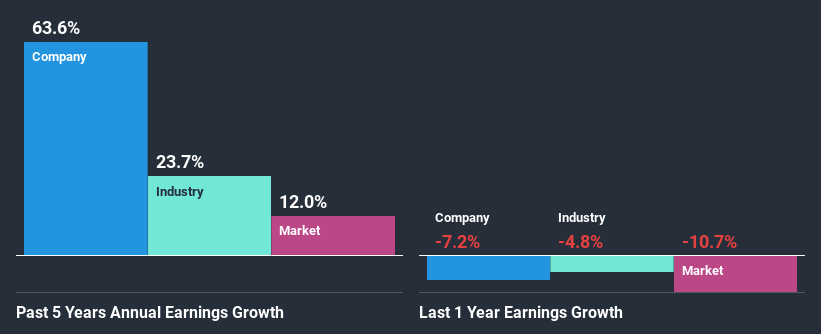Should Weakness in Balfour Beatty plc's (LON:BBY) Stock Be Seen As A Sign That Market Will Correct The Share Price Given Decent Financials?

With its stock down 15% over the past three months, it is easy to disregard Balfour Beatty (LON:BBY). However, stock prices are usually driven by a company’s financials over the long term, which in this case look pretty respectable. Specifically, we decided to study Balfour Beatty's ROE in this article.
ROE or return on equity is a useful tool to assess how effectively a company can generate returns on the investment it received from its shareholders. In simpler terms, it measures the profitability of a company in relation to shareholder's equity.
See our latest analysis for Balfour Beatty
How Do You Calculate Return On Equity?
The formula for ROE is:
Return on Equity = Net Profit (from continuing operations) ÷ Shareholders' Equity
So, based on the above formula, the ROE for Balfour Beatty is:
6.5% = UK£105m ÷ UK£1.6b (Based on the trailing twelve months to June 2020).
The 'return' is the amount earned after tax over the last twelve months. So, this means that for every £1 of its shareholder's investments, the company generates a profit of £0.07.
What Is The Relationship Between ROE And Earnings Growth?
We have already established that ROE serves as an efficient profit-generating gauge for a company's future earnings. We now need to evaluate how much profit the company reinvests or "retains" for future growth which then gives us an idea about the growth potential of the company. Assuming all else is equal, companies that have both a higher return on equity and higher profit retention are usually the ones that have a higher growth rate when compared to companies that don't have the same features.
A Side By Side comparison of Balfour Beatty's Earnings Growth And 6.5% ROE
When you first look at it, Balfour Beatty's ROE doesn't look that attractive. Next, when compared to the average industry ROE of 12%, the company's ROE leaves us feeling even less enthusiastic. However, we we're pleasantly surprised to see that Balfour Beatty grew its net income at a significant rate of 64% in the last five years. So, there might be other aspects that are positively influencing the company's earnings growth. For example, it is possible that the company's management has made some good strategic decisions, or that the company has a low payout ratio.
As a next step, we compared Balfour Beatty's net income growth with the industry, and pleasingly, we found that the growth seen by the company is higher than the average industry growth of 24%.
Earnings growth is a huge factor in stock valuation. The investor should try to establish if the expected growth or decline in earnings, whichever the case may be, is priced in. This then helps them determine if the stock is placed for a bright or bleak future. Has the market priced in the future outlook for BBY? You can find out in our latest intrinsic value infographic research report.
Is Balfour Beatty Making Efficient Use Of Its Profits?
While the company did pay out a portion of its dividend in the past, it currently doesn't pay a dividend. This is likely what's driving the high earnings growth number discussed above.
Looking at the current analyst consensus data, we can see that the company's future payout ratio is expected to rise to 32% over the next three years. However, Balfour Beatty's future ROE is expected to rise to 11% despite the expected increase in the company's payout ratio. We infer that there could be other factors that could be driving the anticipated growth in the company's ROE.
Summary
On the whole, we do feel that Balfour Beatty has some positive attributes. With a high rate of reinvestment, albeit at a low ROE, the company has managed to see a considerable growth in its earnings. With that said, the latest industry analyst forecasts reveal that the company's earnings growth is expected to slow down. Are these analysts expectations based on the broad expectations for the industry, or on the company's fundamentals? Click here to be taken to our analyst's forecasts page for the company.
This article by Simply Wall St is general in nature. It does not constitute a recommendation to buy or sell any stock, and does not take account of your objectives, or your financial situation. We aim to bring you long-term focused analysis driven by fundamental data. Note that our analysis may not factor in the latest price-sensitive company announcements or qualitative material. Simply Wall St has no position in any stocks mentioned.
Have feedback on this article? Concerned about the content? Get in touch with us directly. Alternatively, email editorial-team@simplywallst.com.


